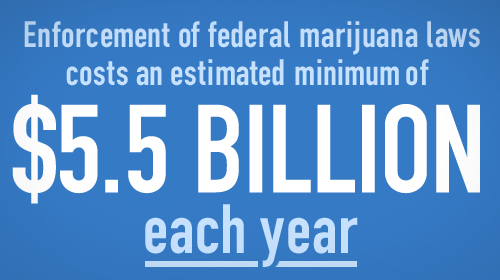
Washington and Colorado made big news on Election Day last year when residents voted to legalize small amounts of recreational marijuana – could the federal government be next? Last week, two bills were introduced in the House of Representatives aimed at resolving the difference between laws in states like Washington and Colorado and federal law.
The first bill, introduced by Congressman Jared Polis (D-CO), treats marijuana like alcohol and tobacco by requiring growers to obtain a federal permit. His proposal would address the inconsistency between federal law and state law in states that choose to legalize. Congressman Earl Blumenauer (D-OR) introduced the other bill, which creates a framework to begin taxing the production and sale of marijuana.
This isn't the first time Congress has considered steps toward legalization, but now momentum is on our side. According to a recent poll, more than half of Americans think the federal government should leave states alone when it comes to drug laws. More and more people are realizing that criminalizing marijuana just doesn't make sense.
The war on marijuana is waged at a tremendous personal and financial cost. Don't believe me? Take a look at these two figures:
- Over 660,000 people were arrested for marijuana possession in 2011.
- Enforcement of federal marijuana laws costs an estimated minimum of $5.5 billion dollars each year.
That's far too many lives upended for a using a drug that nearly half of the nation thinks should be legal for recreational purposes and 70 percent feel should be legal for medicinal purposes. More Americans are already deprived of their liberty today than ever before – unfairly and unnecessarily, with no benefit to public safety. The criminalization of marijuana only adds to this problem.
The laws passed in Colorado and Washington put the administration in a difficult position, since the states legalized a substance that is still treated as illegal and actively prosecuted by the federal government. The bill proposed by Polis would allow other states to decide their own drug policy without interference from the federal government. If more states are going to follow the lead of Colorado and Washington, we need to guarantee that federal authorities won't arrest recreational users.
Learn more about marijuana and drug law reform and other civil liberties issues: Sign up for breaking news alerts, follow us on Twitter, and like us on Facebook.
Stay informed
Sign up to be the first to hear about how to take action.
By completing this form, I agree to receive occasional emails per the terms of the ACLU's privacy statement.
By completing this form, I agree to receive occasional emails per the terms of the ACLU's privacy statement.

